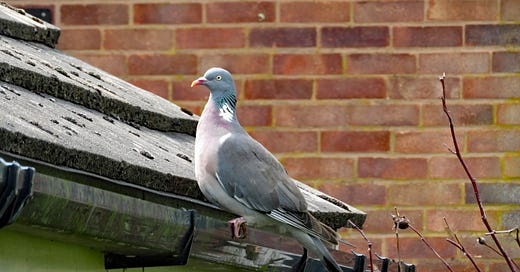“My TOE hurts, mumm-y, my TOE hurts mumm-y.”
“The SEESAW’s muddy, the SEESAW’s muddy.”
“The WORLD’s gone crazy, the WORLD’s gone crazy.”
Just a few ways to remember the song of the woodpigeon.
Woodpigeons are our commonest, and largest, pigeon. Their oft-repeated phrase seems to change tone depending on the context - sometimes mellow and relaxed, at other times hoarse and a little manic.
It’s also one of those select few sounds likely to be amplified by a chimney.
Whether hidden on a rooftop, or tucked away in a tree, it’s the five-note phrase that gives the woodpigeon away.
The main confusion is with the sound of the collared dove, but that’s three notes (coo-COO-coo, coo-COO-coo).
If in doubt, remember that collared doves profess their ignorance (“I don’t know, I know know”), whereas woodpigeons profess their deep ignorance (“I REAL-LY don’t know, I REAL-LY don’t know”).
Woodpigeons don’t have a breeding season so much as a whenever-they-fancy-it tendency. They will nest in any month of the year, given the right conditions.
Given the quality of their nest-building it seems miraculous that woodpigeons are common at all. The eggs are laid on what’s often a flimsy-looking, sometimes two-dimensional, collection of bare twigs.
But woodpigeons do have a parental superpower.
In common with other doves, woodpigeons feed their offspring on a kind of milk produced in their crop, an area of their digestive tract near the throat.
So long as food such as grain and berries is plentiful for the adults they can produce milk and attempt to raise young.
In late summer, with grain ripening in the fields and most other birds quiet, the woodpigeon’s song carries on.
This inspired Irish poet Katherine Tynan’s lines in her work, The Doves. Note that “cushat” is an old country name for woodpigeon:
The house where I was born,
Where I was young and gay,
Grows old amid its corn,
Amid its scented hay.
Moan of the cushat dove,
In silence rich and deep;
The old head I love
Nods to its quiet sleep.
Where once were nine and ten
Now two keep house together;
The doves moan and complain
All day in the still weather.
Katherine Tynan’s words feature in the excellent entry on woodpigeons in Birds Britannica by Mark Cocker and Richard Mabey, which is where I first discovered this poem.
Next week: Chiffchaff
There’s a new Shriek of the Week every Friday. If you have a friend who might like a dose of birdsong in their inbox, please pass this along. And if you would like a narrated version please considering becoming a paid supporter.
For details of guided spring walks, courses and other beaky stuff, visit the Birdsong Academy site.
Until next week,
~ Charlie




